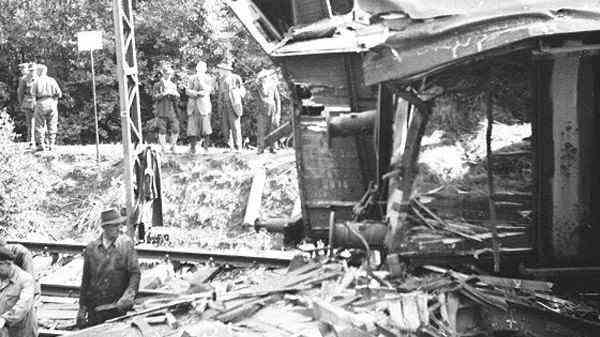A novel can hardly begin more mercilessly: “Apart from the boy and the woman, the platform is empty. They have been standing here since daybreak. The boy’s eyes wander to the old clock hanging under the canopy of the flat ticket hall. He had actually planned counting to a hundred in his head before he next looks at the clock. He endured it until twenty-nine. Twenty-nine. That’s how old Dad was two days ago, the boy thought. And then he looked at the clock again .”
You know the train isn’t coming. That dad first survived the war – and then not. That is exactly the tragedy of the worst train accident in German post-war history, which Simon Viktor makes the subject of his first novel, even worse than the ICE accident in Eschede in 1998.
Much of the novel “Through the World a Crack” is made up. People, dialogues, small incidents, observations. But most of it is – unfortunately – true. Artist agent and TV writer Simon Viktor used part of the pandemic to rummage through archives of eyewitness reports and old logs about the train accident. And then to tell about it on almost 200 pages in two narrative threads.
A reading line is based on historical context
Viktor constructs one reading line from the historical context: since a bomb attack in the last weeks of the war, the electrical safety systems along the tracks in Rosenheim and Munich have been defective. “A train may only enter a section when the train in front has already left it. The dispatcher must report this to his colleague at the rear signal point beforehand. (…). The procedure is complex, yes, sure. But it works .”
106 soldiers lost their lives in the accident.
(Photo: Peter Hinz-Rosin)
But not on July 16, 1945. On that day, just north of Aßling, a freight train loaded with US tanks smashed into a stationary train carrying people returning from the war. You are on your way to Hanover to be released. 106 soldiers are killed, the oldest 55 years old, the youngest of legal age a few months ago.
The narrative thread ticks like a countdown to the day of misfortune: half a year before, ten weeks before, two days before – there is also a merciless perspective on contemporary history. “Mei, many women used to have the children removed from their tummy if they weren’t married. Now the children are handed over to the Führer.”
Viktor weaves the plot of the novel into this reading line. The boy waiting at the West German platform. The Upper Bavarian village not far from the scene of the accident. The people of Aßling themselves carry a lot. The Marra Paul hides under the covers, mistaking lightning for muzzle flash and thunder for artillery salvos. At the old Pongratz Johann, the inside turns out. “The contents of his stomach slaps onto the platform in front of him, an acrid smell hits his nostrils, he has to squint, chokes, his fingernails scrape across the asphalt.”
The novel is a linguistically brilliant portrayal of morals
Viktor has succeeded in writing an impressive historical novel: a linguistically brilliant portrayal of the customs of a village society in a state of emergency – with the claim of a clear cultural-scientific profile. With abrupt changes in the plot, but still along a literary thread. And peppered with onomatopoeia and metaphors: looks that make your skin itch. Ribs screaming in pain. And above it is the moon, bright and beautiful.
And the boy on the platform? Drawn a picture of a dog, all black, because there was only charcoal instead of colored pencils. “The dog’s eyes are black too, like the fresh tar in the bomb craters on the square in front of the train station. (…). He’s already looking forward to the moment when he pulls the paper out of his pocket and unfolds it. Just wait, Dad, until you see the dog. You’ll like it.”
“A crack through the world” will be published by SüdOst Verlag in May.

